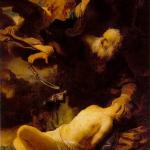
This is a reply to the nicely provocative article, “Why No Roman Catholic Conversions to Protestant Churches?” (8-20-18). It was written by D. G. Hart, who blogs at Patheos in the Evangelical section, called Putting the “Protest” in Protestant. Hart teaches history at Hillsdale College in Michigan: a great politically and culturally conservative college, and is “currently finishing a book on conservative Roman Catholics and American exceptionalism.” His words will be in blue.
*****
With the release of Pope Francis‘ letter in support of the victims of sexual abuse and increasing acknowledgment by thoughtful Roman Catholics of the Crisis of Infidelity that recent revelations have created, is it a bad time to ask why Roman Catholics who are disillusioned with their priests and bishops don’t consider joining a Protestant church?
As a Catholic apologist, I would say that, personally, it’s never a bad time for a Protestant (or anyone else) to ask me anything about Catholicism or my own allegiance to it. In answering your broad question, I feel a bit like a mosquito on a nude beach: where to begin first? Or it’s like asking a happily married man (as I am), “why do you love your wife?” I’ve actually listed 150 reasons why I am a Catholic in one paper of mine. But I shall do my best, and link to other papers of mine that deal with specific points in depth.
The first reason that comes to mind, in reaction to your opening statements, is the fact that “sin in the Church” (or in a Protestant denomination, from the opposite perspective) is never a sufficient reason to leave any Christian communion (I’ve written about this topic many times, including my article, “The Sex Scandals Are Not a Reason to Reject Catholicism“).
I refer to the presence of sin among and in practitioners of a particular communion. The reason one ought to choose one particular version of Christianity is because it teaches true theology (including true moral teaching): as best can be ascertained, in terms of the nature of the Bible and historic Christianity: what has been taught from the time of the early Church, and has been passed down.
So, for example, the first issue I changed my mind on, in my journey from evangelicalism to Catholic, was contraception, which I discovered was opposed by all Christians, until 1930, when the Anglicans first changed their view (and even then, only partially).
Having come to realize that, and in my strong desire (back in 1990, as a zealous evangelical apologist and evangelist) to fully follow biblical and historic Christian teaching, I can hardly become a Protestant again, because virtually no Protestants understand that it is a grave sin. Even the Eastern Orthodox have (for the most part) caved on the issue.
This is one example of many of what we would describe as “calling evil good.” That is what I cannot in good conscience participate in. With the Catholic sex scandal, on the other hand, it is a case of heinous sin tragically taking hold among a certain percentage of Catholic clergy. No Catholic is calling evil good with regard to that. We all heartily condemn the terrible sins.
We don’t teach that the sins are okay, as scores of Protestant denominations (and just about all the mainline ones) do on other sex-related issues such as abortion, divorce, fornication, and “gay marriage”: to name a few things. I would contend that the Catholic Church (and she alone) holds very firmly to biblical and ancient Christian teaching on all these issues.
This is a major reason why I am a Catholic. It’s not because I think Protestantism (on the whole) is a “bad” thing (or because Catholic persons are supposedly far superior morally to other Christians: what a joke!). I believe that Protestantism is a very good thing (at least the evangelical and more traditional portions of it), but that Catholicism is the best thing, ecclesiologically speaking.
I understand that Orthodox Presbyterianism, my own communion, has lots of foibles that put seekers off — starting with Calvinism. But why not Lutheranism?
I have great respect for both communions (I am a big fan of Francis Scaheffer and have read Machen’s book on liberalism), and have engaged in many wonderful dialogues with practitioners thereof (especially Lutherans), but my analysis above would apply, for the most part.
Both caved on contraception years ago, and more recently on divorce (C. S. Lewis couldn’t even marry a divorced woman in Anglicanism in the late 50s: imagine that!). Lutherans besides Missouri and Wisconsin Synods have officially espoused a woman’s choice to have her own child in the womb killed, and (without checking) have likely caved on the “gay marriage” issue.
And of course, that doesn’t even get to a host of theological issues. We think both groups have erroneous teachings with regard to the Eucharist (Lutherans being much closer to us), sola Scriptura, sola fide, apostolic succession, tradition, Mariology, penance, absolution, five of the seven sacraments, the papacy, Church governance (hierarchy, bishops, etc.), baptismal regeneration (for the Presbyterians), purgatory, communion of saints, praying for the dead, the sacrifice of the Mass, the deuterocanonical books, liturgical matters, etc.
In other words, these are the “Catholic distinctives” (i.e., simply historic Christianity before the 16th century) that I have vigorously defended from the Bible (and tradition) in several of my books (A Biblical Defense of Catholicism, The Catholic Verses, The One-Minute Apologist, and Proving the Catholic Faith is Biblical).
So why can’t a Roman Catholic find teaching, worship of Jesus, and the good news of salvation among Lutherans? Is Protestantism really that yucky?
Those things are there (I used to attend a Lutheran church from 1977-1980), but it (like every other Protestant denomination, to more or less degrees) also holds to theological and moral errors that an educated, observant Catholic cannot accept. From our perspective, it’s like going from a magnificent feast, to a bread and water diet.
I sort of understand for cradle Roman Catholics. This is the communion in which they have been reared. They have lots of associations — family, holiday, favorite priest or nun, maybe even a parochial school — with the church.
I didn’t have any of those associations for the first 32 years of my life. But none of those are essential, central reasons to be or not be a Catholic.
What you cite from Vatican II supports what I have written above. It states that Protestants lack a full Catholic eucharistic understanding and the sacrament of orders (ordination). Vatican II urges Catholics to share our faith with non-Catholics, in order to persuade them to join us in the fullness of historic Christianity. You must have missed that part of it.
Yes, we acknowledge the sacramental (regenerative) validity of Protestant trinitarian baptism (reiterated at Trent and not introduced at Vatican II), and (what is far less known) we also regard the marriage between two lifelong Protestants as sacramental as well. But none of that wipes out the lack of so many theological and moral teachings, as outlined above. If that is all a Christian knows (as used to be the case with myself, from 1977-1990), then it’s good.
But for the Catholic who has participated in the fullness of Christianity, it can never (again, or for the first time) be enough. It will always be — notwithstanding many good and true Christian teachings in it and lots of wonderful, godly Christians — fundamentally deficient.
A Protestant can indeed be saved, under certain conditions (CCC 847, quoting Vatican II document Lumen Gentium, 16), but we also hold that if he or she truly knows that Catholicism is the fullness of the Christian faith (only God knows their hearts and the extent of their understanding), and rejects it, that they are in danger of final damnation. In that sense, we still do assuredly hold to “no salvation outside the Church”:
Basing itself on Scripture and Tradition, the Council teaches that the Church, a pilgrim now on earth, is necessary for salvation: the one Christ is the mediator and the way of salvation; he is present to us in his body which is the Church. He himself explicitly asserted the necessity of faith and baptism, and thereby affirmed at the same time the necessity of the Church which men enter through baptism as through a door. Hence they could not be saved who, knowing that the Catholic Church was founded as necessary by God through Christ, would refuse either to enter it or to remain in it. (CCC 846, again citing Lumen Gentium)
Coming over to Protestantism may be like going from a Cadillac to a Nissan, but it will — if I read the Second Vatican Council aright — get me there.
Why would anyone want to do that? You’re arguing against yourself and making my case for me!
It was not as if I don’t become a Roman Catholic, the eternal destiny of my soul is in jeopardy. Instead, the question was one that had to do with a fuller and richer understanding of Christianity than the one he or she had as a Protestant . . .
Well, their souls would be in jeopardy, if they understood the unique status of the Catholic Church (per CCC 846 above). That’s why, for us converts, when we come to fully understand that, we have no other choice in good conscience, but to be received into the Catholic Church. We can no longer be as unknowing or uneducated as we were.
You cite two conversion stories. I have several versions of my own on my Conversion and Converts page, if you or anyone else is interested. One account was published in the big 1994 bestseller, Surprised by Truth (edited by Pat Madrid). Another, much more theologically detailed story (stressing development of doctrine, which was key for me) was published in two different Catholic magazines.
In other words, these converts thought they were saved before they joined the Roman Catholic Church. Once they changed ecclesial affiliations, they experienced what was for them a fuller faith. But it wasn’t as if they went from pagan, or unbeliever, or agnostic to being a “real” Christian.
That’s quite correct. I am extremely grateful for all that I learned in my 13 years as an evangelical. I utilize those things every day in my work. I have nothing but fond memories from that period (and longtime cherished friends whom I met then). But this is no reason not to become Catholic, and the more one knows, they are indeed in danger of possible hellfire. This is what you don’t seem to be grasping. That is what Catholic Church teaches, and it was strongly reiterated — not rejected — at Vatican II.
Which means that Protestant converts to Rome can well imagine what it is like to be a Christian outside the Roman Catholic Church. In most conversion accounts, the converts thought of their pre-Roman experience as part of being saved.
Yep; very true in my case and in that of most converts. But again, it is no reason whatever to return to Protestantism, having learned all that we have learned in becoming a Catholic and fully accepting all that the Church infallibly teaches. I made an analogy of the deficiency of Protestantism compared to Catholicism, in an overview on development of doctrine, written in 1995:
One might say that an automobile was “corrupt” if the owner decided that it ran better with no muffler, no shocks, no air or fuel filters, half of its spark plugs, watered-down gas, no rear brakes, one headlight, no heat, three quarts low on oil, with half of its radiator coolant, etc. Corruption can consist of “subtraction” as well as “addition.” Protestantism’s charges against Catholicism, closely scrutinized, only come back to incriminate itself.
In which case, when trials over wayward priests and unfaithful bishops hound lay Roman Catholics, what would be so bad about coming over and joining their separated brothers and sisters?
All explained above . . . If the presence of actual sin among fallen Catholics is a reason to reject Catholicism as a Church and developed body of teaching (it is not at all), then institutionalized sin in Protestantism (calling evil good) and serious theological / doctrinal deficiency are much more solid reasons to reject any version of Protestantism that I’ve ever seen.
Not that they are all bad, or bad through and through (they are not!); but these are very serious issues for a conscientious Christian who wants to follow the full biblical and historic Christian teaching, to seriously consider. This is why those of us Catholics who understand and accept all that the Church teaches don’t return to Protestantism, or become Protestants for the first time in our lives.
Lastly (as a very relevant “footnote”), since the Catholic sex scandals was your opening “salvo” so to speak, and the primary reason you give for Catholics forsaking their Church, it’s almost self-evident that just about all other major institutions (e.g., government, the mass media, Hollywood, the music industry) are also having the same sorts of problems. Protestantism is included in that, as we see from the current scandal among Southern Baptists, and the sad Bill Hybels scandal, and in my two copiously documented articles from 2005 and 2007: Scandalous Sexual Misconduct Committed by Protestant Clergy / Orthodox, Protestant, & Jewish Clergy & Sexual Abuse.
***
Photo credit: Bonelli (June 2007). The fork for Wernfigin on the road to Pentre’r-felin (Wales). The wood in the background is Coed Mawr [Wikimedia Commons / Creative Commons Attribution-Share Alike 2.0 Generic license]
***













